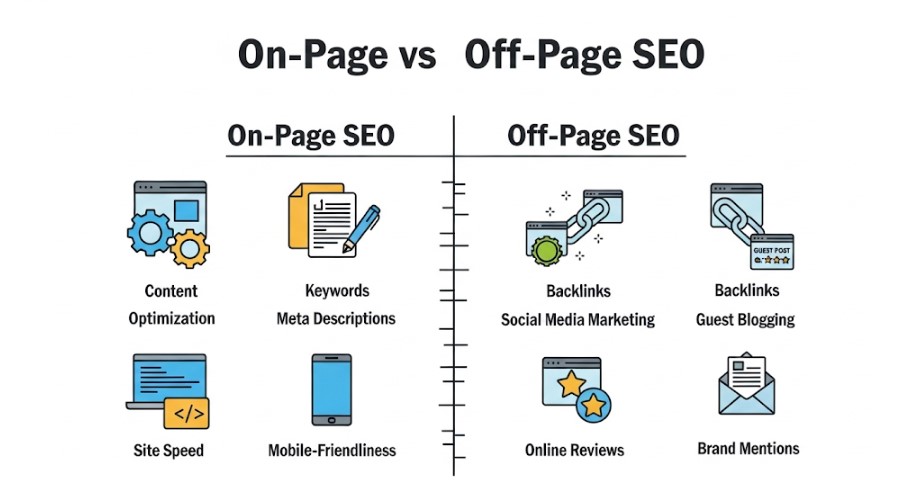
On-page and off-page SEO work together to improve search visibility. On-page SEO optimizes content and site structure, while off-page SEO builds authority through backlinks and external signals. A balanced approach strengthens rankings, credibility, and long-term organic growth, helping websites compete effectively in search results.
Search engine optimization can feel overwhelming when you’re just starting out. Between technical audits, keyword research, and link building, there’s a lot to wrap your head around. But here’s the thing: SEO really boils down to two main categories that work together to boost your website’s visibility.
On-page SEO focuses on optimizing elements directly on your website—think content, meta tags, and site structure. Off-page SEO, on the other hand, involves activities outside your website that signal to search engines that your content is valuable and trustworthy.
Understanding the difference between these two approaches is crucial for building a successful SEO strategy. You can’t rely on just one or the other. The websites that rank highest in search results master both on-page and off-page techniques.
What is On-Page SEO?
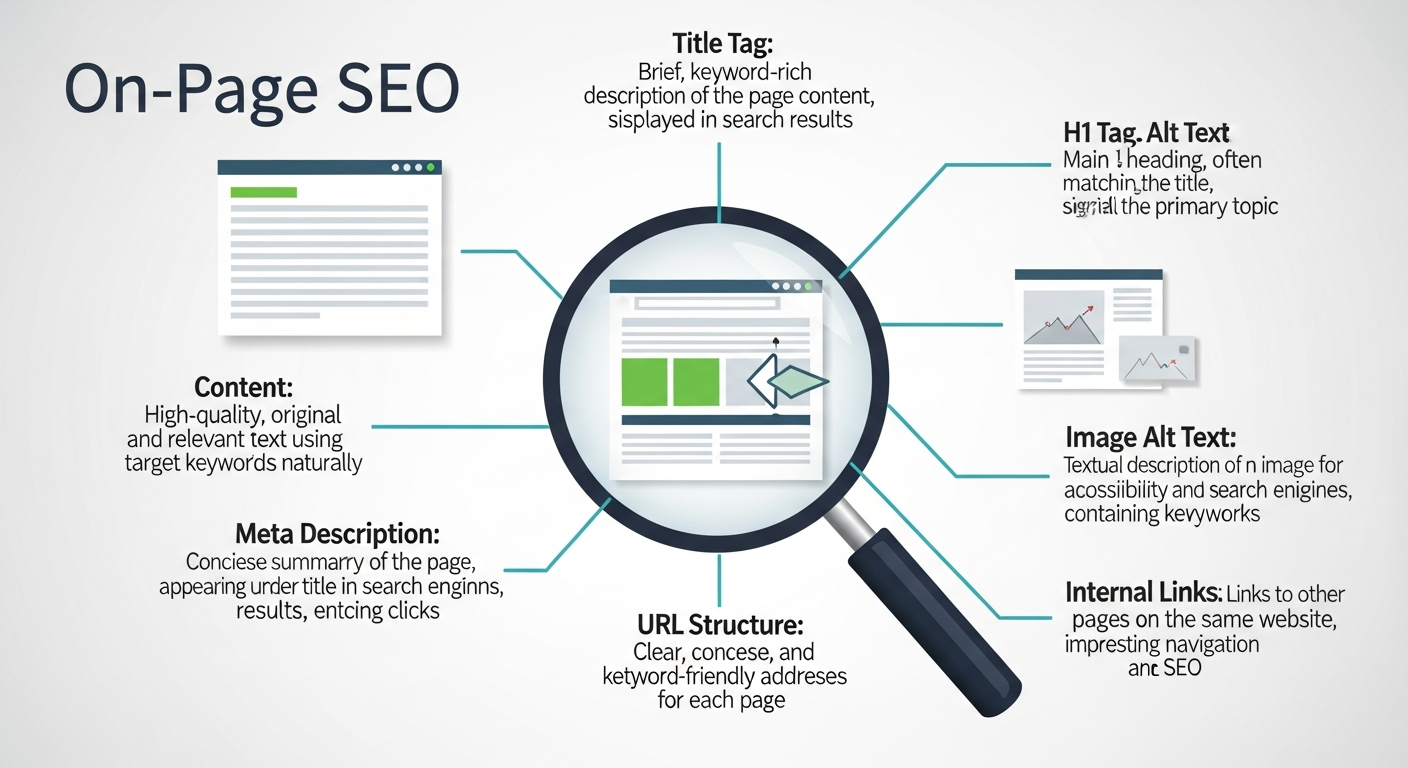
On-page SEO refers to all the optimization strategies you implement directly on your website to improve its search engine rankings. These are elements you have complete control over, from the words you write to how your site is structured.
The goal of on-page SEO is to help search engines understand what your content is about and ensure it provides value to users. When done correctly, on-page optimization makes it easier for search engines to crawl, index, and rank your pages.
Key On-Page SEO Elements
Content Quality and Optimization
Your content forms the foundation of on-page SEO. Search engines prioritize pages that provide comprehensive, well-researched answers to user queries. This means creating content that’s not only keyword-optimized but genuinely helpful to your audience.
Title Tags and Meta Descriptions
Title tags appear as clickable headlines in search results, while meta descriptions provide a brief summary of your page content. Both elements influence click-through rates and help search engines understand your page topic.
Header Structure (H1, H2, H3)
Proper header tags create a logical content hierarchy that makes your content easier to read for both users and search engines. Your H1 should contain your primary keyword, while H2 and H3 tags help organize supporting topics.
URL Structure
Clean, descriptive URLs that include relevant keywords perform better in search results. A URL like “yoursite.com/on-page-seo-guide” is much more effective than “yoursite.com/page123.”
Internal Linking
Strategic internal links help distribute page authority throughout your site while keeping users engaged. They also help search engines discover and index your content more effectively.
Image Optimization
Optimizing images with descriptive alt text and appropriate file names helps search engines understand your visual content while improving accessibility for users with disabilities.
What is Off-Page SEO?
Off-page SEO encompasses all the activities that happen outside your website to improve its search engine rankings. These strategies focus on building your site’s authority, credibility, and relevance through external signals.
While you can’t directly control off-page factors the same way you control on-page elements, you can influence them through strategic outreach, relationship building, and content marketing.
Key Off-Page SEO Elements
Backlink Building
Backlinks remain one of Google’s top ranking factors. When reputable websites link to your content, it signals to search engines that your site is trustworthy and valuable. However, quality matters more than quantity—one link from a high-authority site can be worth more than dozens of low-quality links.
Social Media Engagement
While social media signals aren’t direct ranking factors, they can indirectly impact your SEO. Social platforms help amplify your content, increase brand awareness, and drive traffic to your website.
Brand Mentions and Citations
Even unlinked mentions of your brand name can influence your search rankings. Consistent NAP (Name, Address, Phone) citations across directories are particularly important for local businesses.
Guest Posting and Content Marketing
Publishing high-quality content on other reputable websites helps build backlinks while establishing your expertise in your industry.
Online Reviews and Reputation Management
Positive reviews on platforms like Google My Business, Yelp, and industry-specific sites can boost your local search visibility and overall online reputation.
On-Page vs Off-Page SEO: Key Differences
The main difference between on-page and off-page SEO lies in control and implementation. On-page SEO involves elements you can directly modify on your website, while off-page SEO requires building relationships and earning recognition from external sources.
Time Investment
On-page optimizations often produce quicker results since you can implement changes immediately. Off-page SEO typically requires more time to show results, as building quality backlinks and establishing authority happens gradually.
Cost Considerations
On-page SEO is generally more cost-effective since it primarily requires time and effort rather than monetary investment. Off-page SEO might involve costs for outreach tools, content creation for guest posts, or professional link building services.
Sustainability
On-page optimizations remain under your control and can provide long-term benefits with periodic updates. Off-page SEO requires ongoing effort to maintain and build upon previous work.
How On-Page and Off-Page SEO Work Together
The most successful SEO strategies combine both on-page and off-page optimization. Think of on-page SEO as building a solid foundation, while off-page SEO constructs the walls and roof of your search visibility.
Without strong on-page optimization, even high-quality backlinks won’t help your pages rank well. Conversely, perfectly optimized pages without external validation struggle to compete against sites with strong backlink profiles.
Content-Link Connection
High-quality, well-optimized content naturally attracts backlinks. When your on-page SEO creates valuable resources, other websites are more likely to reference and link to them.
Authority Building
On-page expertise combined with off-page recognition establishes your site as an authority in your field. This combination helps you rank for competitive keywords and maintain long-term search visibility.
Best Practices for On-Page SEO
Start with comprehensive keyword research to understand what your audience is searching for. Focus on creating content that thoroughly addresses user intent rather than just targeting specific keywords.
Optimize your technical SEO elements, including site speed, mobile responsiveness, and crawlability. These factors significantly impact user experience and search rankings.
Create topic clusters by linking related content together. This approach helps establish topical authority while providing users with comprehensive information on subjects they care about.
Best Practices for Off-Page SEO
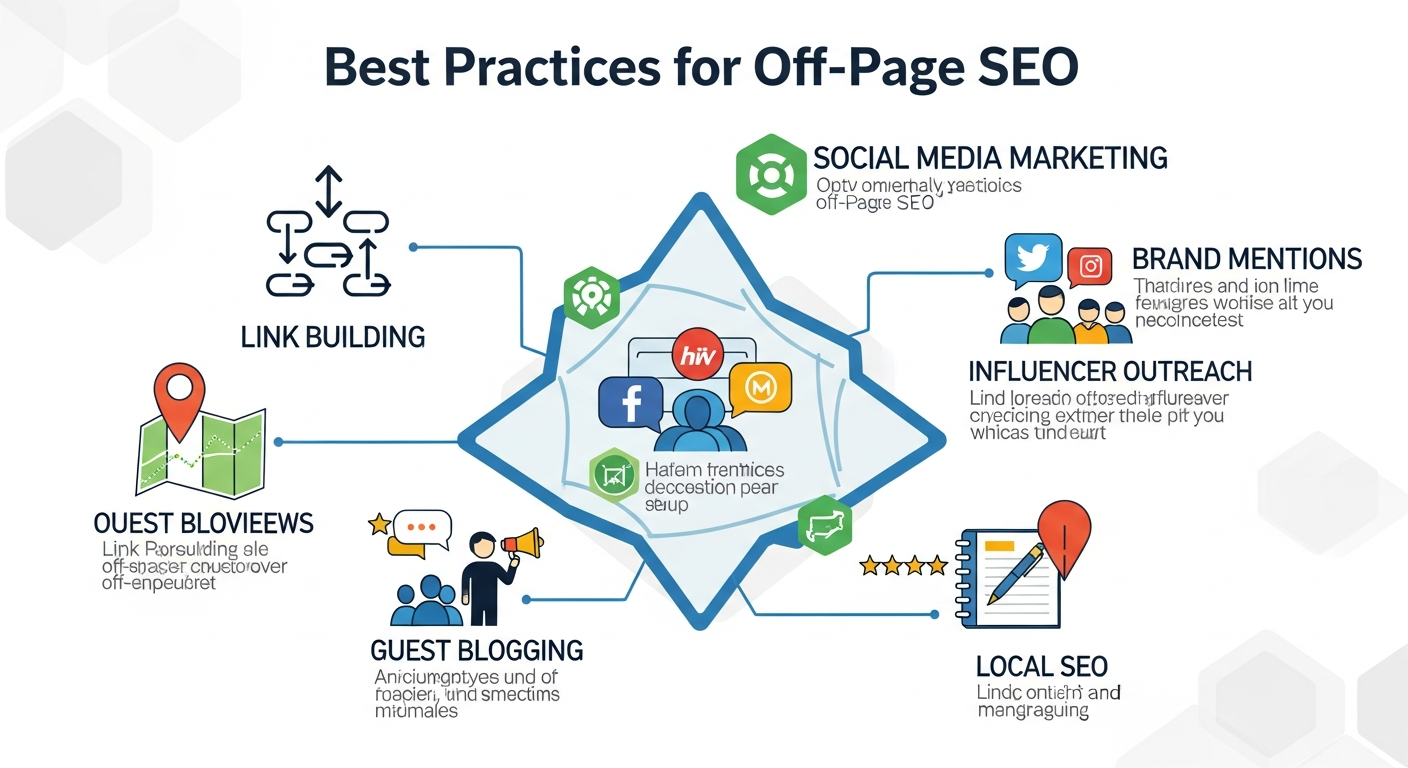
Focus on earning high-quality backlinks from relevant, authoritative websites in your industry. Avoid link schemes or low-quality directories that could harm your rankings.
Build genuine relationships with other professionals in your field. Networking often leads to natural link opportunities and collaborative content projects.
Monitor your brand mentions across the web and engage with your audience on social media. These activities help build brand awareness and can lead to increased search visibility.
Common Mistakes to Avoid
When implementing SEO strategies, it’s easy to fall into certain pitfalls that can hinder your website’s performance. One of the most common mistakes is focusing too heavily on either on-page or off-page SEO while neglecting the other. Websites that concentrate solely on creating optimized content without building external authority—or vice versa—often struggle to achieve high search visibility. A balanced approach that addresses both on-page and off-page factors is essential for sustainable SEO success.
Another frequent error is keyword stuffing in on-page content. Overloading your pages with repetitive keywords may have been a common practice in the past, but modern search engines now prioritize natural, helpful, and user-focused content. Stuffing keywords not only reduces readability for visitors but can also harm your rankings, as search algorithms are designed to detect and penalize such manipulative tactics.
Lastly, many websites make the mistake of pursuing low-quality backlinks or participating in link schemes. While backlinks are an important part of off-page SEO, links from spammy or irrelevant websites can trigger penalties from search engines, damaging your site’s reputation and authority. Instead, focus on earning high-quality, relevant backlinks through relationship-building, guest posting on reputable sites, and creating shareable, valuable content. Avoiding these common mistakes ensures your SEO efforts are both effective and sustainable in the long term.
Measuring SEO Success
Effectively measuring SEO success is crucial to understanding how well your strategies are performing and where improvements are needed. Start by tracking your on-page SEO performance using metrics such as organic traffic, keyword rankings, and user engagement signals. Organic traffic indicates how many users find your site through search engines, while keyword rankings show how well your pages are performing for targeted terms. User engagement signals, including average session duration, bounce rate, and pages per session, help assess whether visitors find your content valuable and relevant. Tools like Google Analytics and Google Search Console provide detailed insights into these metrics, enabling you to evaluate which pages are performing well and which require optimization.
For off-page SEO, monitoring involves analyzing backlinks, brand mentions, and domain authority metrics. Backlink analysis helps determine the quality and quantity of external sites linking to your content, which is a key factor in search engine rankings. Tracking brand mentions, even when links are not included, helps gauge your online reputation and visibility across different platforms. Domain authority and related metrics provide an overview of your site’s credibility compared to competitors. Conducting regular SEO audits ensures that both on-page and off-page strategies are effective, highlights areas that need improvement, and allows you to adapt to algorithm updates or shifts in industry trends. By continuously monitoring and analyzing these metrics, you can make data-driven decisions that optimize your SEO performance and maximize long-term growth.
Building Your Complete SEO Strategy
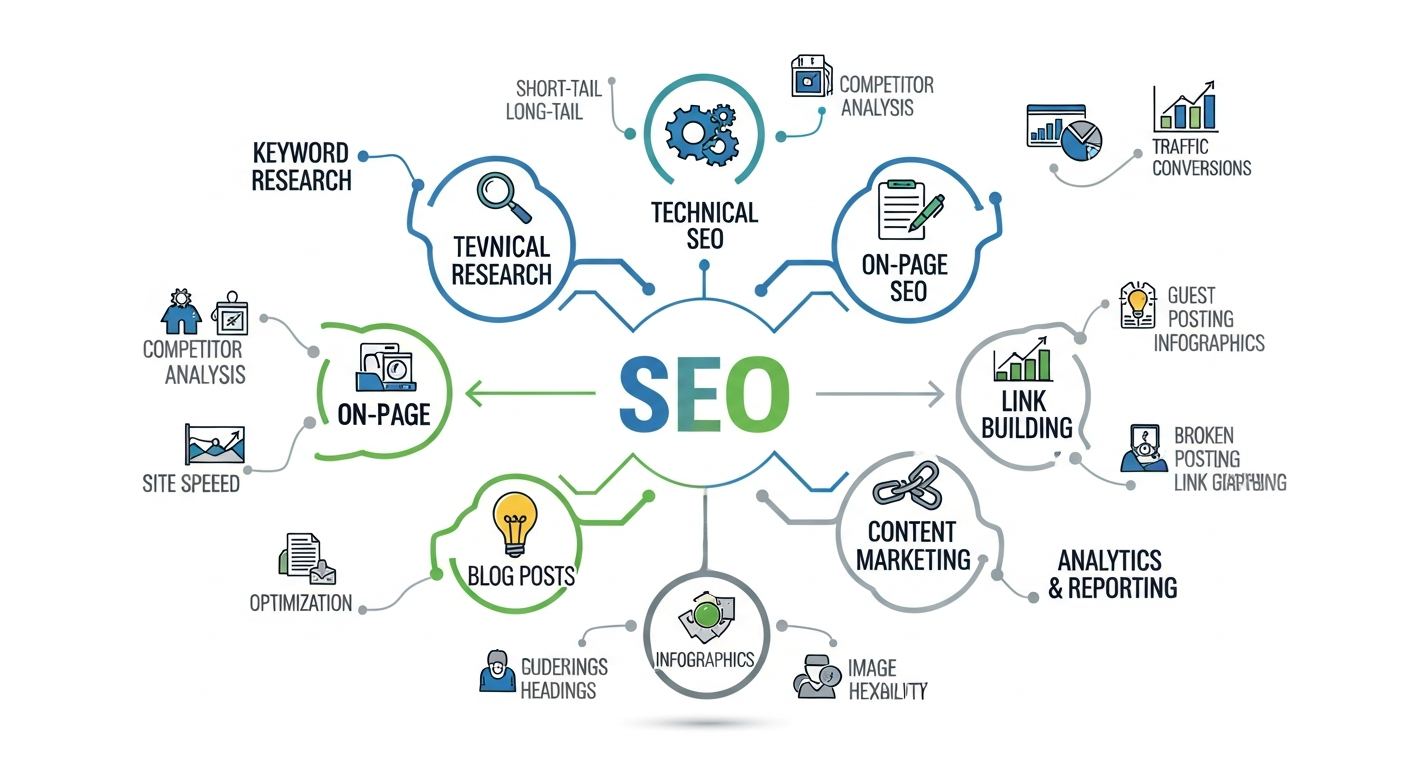
Understanding the relationship between on-page and off-page SEO puts you ahead of competitors who focus on just one approach. The websites that dominate search results excel at both optimizing their own content and earning recognition from external sources. A strong SEO strategy requires a balanced focus on both internal optimizations and external validation, as neglecting either can limit your website’s full potential. By mastering the interplay between these two facets, you position your site to achieve higher rankings, attract more organic traffic, and enhance overall online credibility.
Start by auditing your current on-page elements and identifying quick wins like optimizing title tags or improving your content structure. Conduct a thorough review of your website’s pages to ensure that each element, from meta descriptions to headers, aligns with best practices and serves user intent. Identify areas where content can be expanded, keywords can be naturally incorporated, and internal links can strengthen the site’s architecture. Once your on-page foundation is solid, gradually build your off-page presence through relationship building and strategic content marketing. This involves earning high-quality backlinks from reputable sources, engaging with industry peers, and participating in relevant online communities to increase brand authority and visibility.
Remember that SEO is a long-term investment. Consistent effort across both on-page and off-page optimization will compound over time, leading to sustained organic growth and improved search visibility for your business. Results are rarely instantaneous; patience, persistence, and regular monitoring are key to maintaining momentum. By continuously refining your strategies, tracking performance metrics, and adapting to changes in search engine algorithms, you ensure that your SEO efforts remain effective and your website continues to outperform competitors in the dynamic digital landscape. Ultimately, a comprehensive, integrated approach to SEO not only improves rankings but also enhances user experience, builds trust with your audience, and drives meaningful business growth over the long term.
Conclusion
On-page and off-page SEO are not competing strategies—they are complementary pillars of a successful search engine optimization framework. On-page SEO ensures your website is technically sound, content-rich, and user-friendly, while off-page SEO builds the trust, authority, and credibility needed to stand out in competitive search results.
By optimizing your content, structure, and internal links while simultaneously earning high-quality
Frequently Asked Questions (FAQs)
What is the main goal of on-page SEO?
The primary goal of on-page SEO is to help search engines understand your content while delivering the best possible user experience through optimized content, structure, and technical elements.
What is the main goal of off-page SEO?
Off-page SEO focuses on building authority, trust, and credibility for your website through external signals like backlinks, brand mentions, and online reputation.
Can on-page SEO alone rank a website?
On-page SEO is essential, but it’s rarely enough on its own. Without off-page signals like backlinks, even well-optimized pages may struggle to compete in search results.
Are backlinks still important for SEO?
Yes. Backlinks remain one of the strongest ranking factors. High-quality, relevant links signal trust and authority to search engines.
How often should on-page SEO be updated?
On-page SEO should be reviewed regularly—especially when updating content, targeting new keywords, improving UX, or responding to algorithm updates.
Is off-page SEO risky?
Ethical off-page SEO is safe, but manipulative tactics like buying low-quality links can lead to penalties. Focus on earning links naturally through valuable content and relationships.
Do social media links help SEO?
Social media links don’t directly impact rankings, but they increase visibility, traffic, and content distribution, which can indirectly support SEO success.











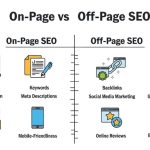

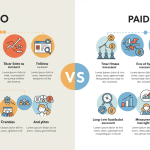
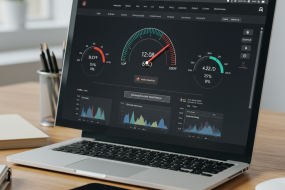


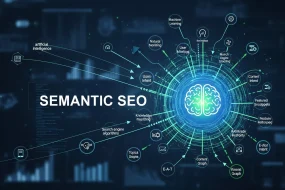
No Comments